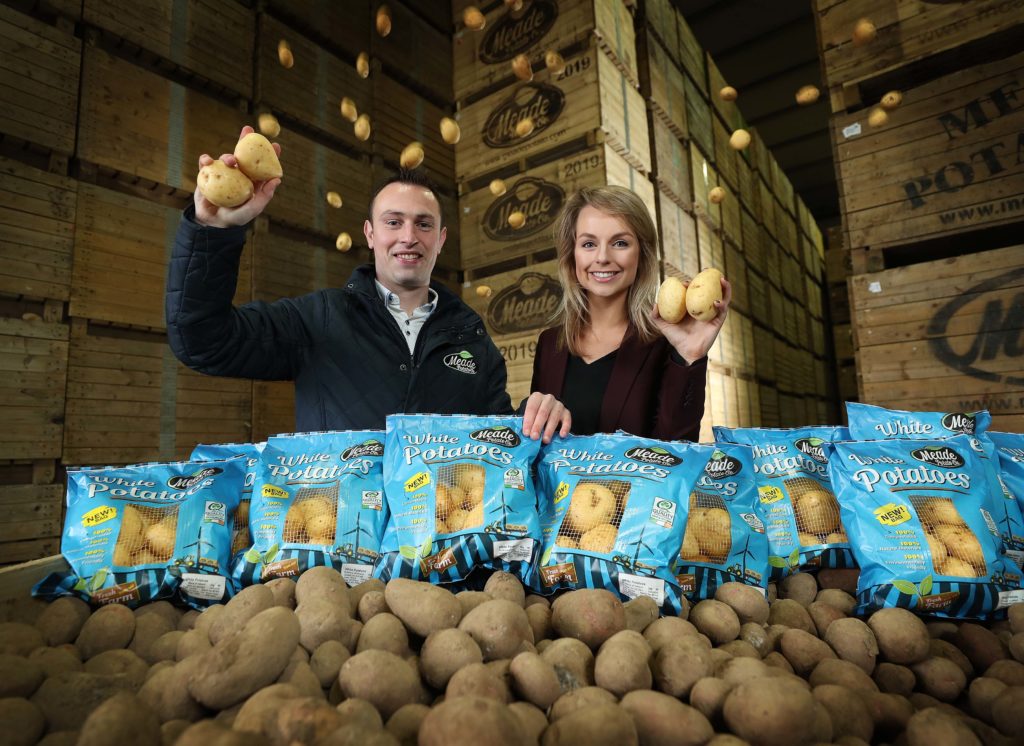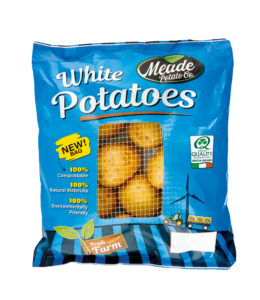
Lidl Ireland, together with supplier Meade Potato Company, has announced the introduction of their 100% compostable form fill potato bag. This bag, which is the first of its kind in the potato category in Ireland, harnesses existing efficient packing machines and eliminates conventional plastic making it fully compostable. The 2kg Meade White Potatoes are available now for €2.69 nationwide through Lidl’s network of 162 stores.
Meade’s 2kg White Potatoes are packed in a 100% Seedling* certified compostable bag that uses FSC** certified sustainably-sourced paper, strengthened with starch and printed with water-based ink. The window of the bag is made with corn-starch based netting. This innovative solution has eliminated all conventional plastic from the packaging making it 100% compostable and suitable for disposal in all consumers’ brown bins for industrial composting***. In addition to this the new bag uses 34% less paper than traditional paper bagging machines.
Meade Potato Company has been working with Lidl Ireland for 20 years and is one of Ireland’s leading growers,  packers and distributors of fresh produce. Based at their farm in Lobinstown, County Meath, the Meade family specialise in growing potatoes, carrots and onions, and work with a team of growers, both in Ireland and abroad, to source a full range of fresh produce for Lidl Ireland.
packers and distributors of fresh produce. Based at their farm in Lobinstown, County Meath, the Meade family specialise in growing potatoes, carrots and onions, and work with a team of growers, both in Ireland and abroad, to source a full range of fresh produce for Lidl Ireland.
Ciara Sheehan, CSR Manager, Lidl Ireland said: “As a business, Lidl has an incredible working relationship with the Meade family so we’re delighted that, as we continue to grow our sustainability strategy, they’re able to grow with us. As we’re fully committed to ensuring we drive positive change for the environment and for our customers, we’re excited to be the first retailer in Ireland to introduce a 100% compostable form fill potato bag.
“Sustainability is core to our business and we’re constantly looking at ways we can change our packaging which has included the removal of black packaging from our entire fruit and vegetable range. Other recent sustainability initiatives to support our customers include the introduction of reusable fruit and vegetable bags in store, the installation of customer recycling bins and now by giving our customers a sustainable packaging option for their potatoes, we’re continuing to empower consumers to make greener choices.”
Philip Meade Jr, Commercial Manager, Meade Potato Company said: “We’ve been working with Lidl since they first came to Ireland two decades ago, introducing new, quality products to the fresh produce category and teaming up with them on sustainability projects, such as the FoodCloud gleaning initiative. We’re delighted to be partnering with them again to bring a more sustainable product to the consumer. This bag represents a breakthrough in packaging. And needless to say, the potatoes packed in the bag are, as we always ensure, absolutely delicious!”
“The introduction of this bag represents a win for the environment and the consumer. Plastic that is hard to recycle has been eliminated completely and replaced with paper that can be composted, ending up ultimately as fertiliser, possibly for growing more potatoes. Consumers get to enjoy the quality potatoes inside the compostable bag. So it’s a win-win all around for everybody!”
This move is one of many steps that Lidl is taking as part of its CSR strategy, A Better Tomorrow. In November, Lidl announced the roll out of ‘Waste Not’, which sees up to 90% price reductions on a range of fresh chilled food products on reaching their best before date but are still perfectly fine to eat. Fresh meat, poultry, fish, and chilled products such as prepared salads, cooked meats, milk and yoghurts, will all qualify for a price reduction through ‘Waste Not’, with the reduction varying per product type. In line with Lidl’s A Better Tomorrow strategy, Meade Potato Company is a zero food waste company, having implemented numerous crop, energy, water and manufacturing efficiency measures throughout their farm and food production facility in conjunction with Bord Bia’s Origin Green programme.
* Seedling Certification and Logo
The compostable certificate awarded to this bag confirms that the packaging, after decomposition under industrial conditions, does not leave a chemical trace harmful to the environment, but pure biomass.
What is the Seedling logo?
The Seedling logo is a registered trademark owned by European Bioplastics. It proves that a product is certified industrially compostable according to the European standard EN 13432.
What does this certification mean exactly?
When successfully certified, the product will fully biodegrade in an industrial composting plant under controlled conditions such as temperature, moisture and time frame – leaving nothing behind but water, biomass and CO2 .
What benefits does the certification have?
Independent certification guarantees that the product fulfils the criteria claimed. As compostable plastics cannot always be easily distinguished from conventional plastics by non-experts, the Seedling logo helps to identify the product and the correct disposal option and thus facilitates correct waste separation, collection and recovery.
** Forest Stewardship Council (FSC) certification ensures that products come from responsibly managed forests that provide environmental, social and economic benefits.
*** Additional information on commercial brown bins (industrial composting) from the European Bioplastics Association:
“Industrial composting is an established process with commonly agreed requirements concerning temperature and timeframe for biodegradable waste to metabolise to stable, sanitised products (biomass) to be used in agriculture (humus/fertiliser). This process takes place in industrial or municipal composting plants. These plants provide controlled conditions, i.e. controlled temperatures, humidity, aeration, etc. for a quick and safe composting process.
The criteria for the industrial compostability of packaging are set out in the European standard EN 13432. EN 13432 requires the compostable plastics to disintegrate after 12 weeks and completely biodegrade after six months. That means that 90 percent or more of the plastic material will have been converted to CO2. The remaining share is converted into water and biomass – i.e. valuable compost. Materials and products complying with this standard can be certified and labelled accordingly.”
Additional information about the bag:
Potatoes are traditionally packed in two ways, either by paper bagging machines or by form filling (also called pillow pack) machines. The paper baggers use an average of 35g of paper per 2kg of product. The form filled bag now available in Lidl stores uses only 23g of paper per 2kg of product. Prior to the introduction of this new 100% compostable bag to the market, form fillers could only use conventional plastic; it was not possible to use regular paper in the process. With the new starch-coated paper product and some modifications to their machines, Meade Potato Company has been able to introduce a product that eliminates conventional plastic from the form filled packing process. Suitable for lighter pack sizes, the form filled process is also more energy efficient than a paper bagger. When composted, the bag ultimately ends up as a fertiliser (compost) for growing more crops.
